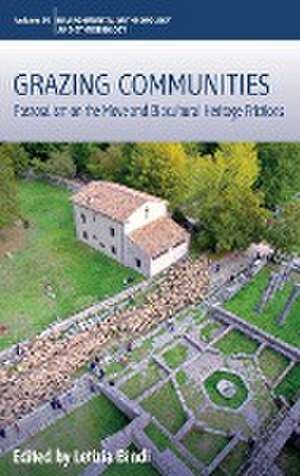Grazing Communities: Environmental Anthropology and Ethnobiology
Editat de Letizia Bindien Limba Engleză Hardback – 13 mai 2022
| Toate formatele și edițiile | Preț | Express |
|---|---|---|
| Paperback (1) | 122.92 lei 3-5 săpt. | +19.66 lei 7-13 zile |
| BERGHAHN BOOKS – 5 iul 2024 | 122.92 lei 3-5 săpt. | +19.66 lei 7-13 zile |
| Hardback (1) | 805.97 lei 6-8 săpt. | |
| BERGHAHN BOOKS – 13 mai 2022 | 805.97 lei 6-8 săpt. |
Din seria Environmental Anthropology and Ethnobiology
-
 Preț: 304.17 lei
Preț: 304.17 lei -
 Preț: 221.88 lei
Preț: 221.88 lei -
 Preț: 120.53 lei
Preț: 120.53 lei -
 Preț: 222.75 lei
Preț: 222.75 lei -
 Preț: 227.30 lei
Preț: 227.30 lei - 23%
 Preț: 749.02 lei
Preț: 749.02 lei - 23%
 Preț: 752.29 lei
Preț: 752.29 lei - 23%
 Preț: 748.72 lei
Preț: 748.72 lei - 23%
 Preț: 750.89 lei
Preț: 750.89 lei - 19%
 Preț: 699.80 lei
Preț: 699.80 lei -
 Preț: 257.69 lei
Preț: 257.69 lei -
 Preț: 264.82 lei
Preț: 264.82 lei - 23%
 Preț: 747.25 lei
Preț: 747.25 lei -
 Preț: 260.02 lei
Preț: 260.02 lei -
 Preț: 303.11 lei
Preț: 303.11 lei - 23%
 Preț: 825.34 lei
Preț: 825.34 lei - 23%
 Preț: 749.77 lei
Preț: 749.77 lei -
 Preț: 261.77 lei
Preț: 261.77 lei -
 Preț: 262.32 lei
Preț: 262.32 lei -
 Preț: 263.88 lei
Preț: 263.88 lei
Preț: 805.97 lei
Preț vechi: 1046.71 lei
-23% Nou
Puncte Express: 1209
Preț estimativ în valută:
154.24€ • 160.44$ • 127.34£
154.24€ • 160.44$ • 127.34£
Carte tipărită la comandă
Livrare economică 12-26 aprilie
Preluare comenzi: 021 569.72.76
Specificații
ISBN-13: 9781800734753
ISBN-10: 1800734751
Pagini: 328
Dimensiuni: 157 x 235 x 22 mm
Greutate: 0.59 kg
Editura: BERGHAHN BOOKS
Seria Environmental Anthropology and Ethnobiology
ISBN-10: 1800734751
Pagini: 328
Dimensiuni: 157 x 235 x 22 mm
Greutate: 0.59 kg
Editura: BERGHAHN BOOKS
Seria Environmental Anthropology and Ethnobiology
Notă biografică
Letizia Bindi has been a professor of Cultural and Social Anthropology at several Italian Universities and a visiting scholar in Spanish, French, Polish and other non-European Universities. In 2009 received the Tanturri Foundation Prix for Anthropological and Popular Traditions Studies. She is presently a professor at the University of Molise, Italy.
Descriere
The present critical discourse on sustainable and responsible development implies a change of practices, a huge socio-economic transformation, and the return of new shepherds and herders in different European regions. This book is an occasion to reconsider grazing communities' frictions in the new global heritage scenario.
